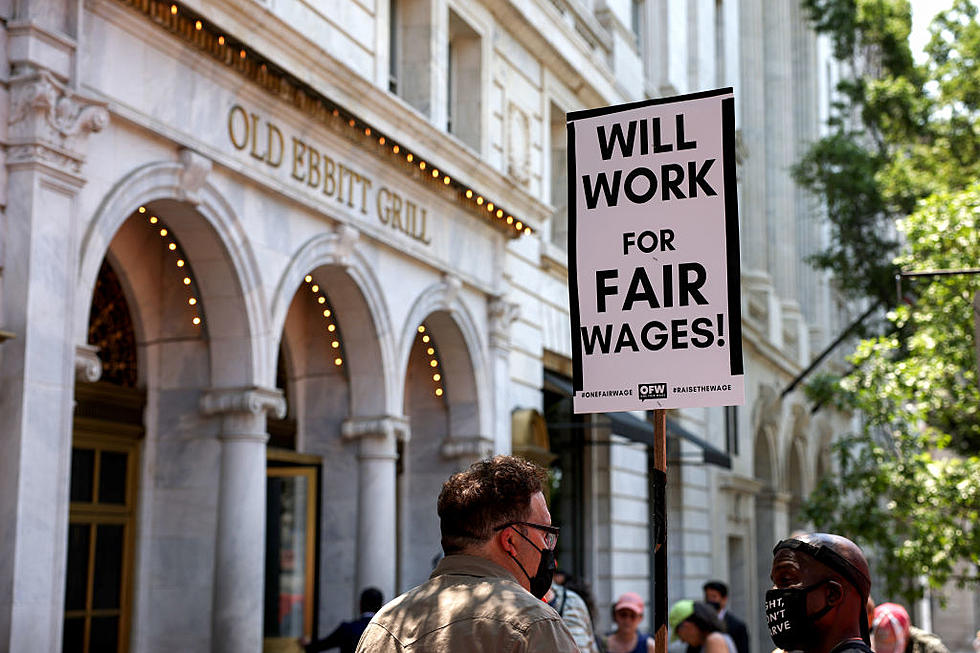
Oklahoma Poised to Let Okies Vote on a New Higher Minimum Wage
When I first entered the workforce, I was a Northern Oklahoma farmhand for twelve hours each day. While I looked forward to those long days in a tractor or combine, 90% of that work was done on the ground under a plow or building fences.
It was hot, sweaty, miserable work but I earned my minimum high-school wage, an honest $5.15 an hour. That farmer also took out taxes, but I later realized he never paid them in and was just stealing cash out of my weekly check, but you live and learn, right?

The sense of wanting more pay was simple in those days. Need more money? Work more hours. I promise Oklahoma's farmers can find enough work to keep you busy 18 hours a day, seven days a week.
Things aren't that simple in the world around us anymore. We're at a point in time where plenty of employers intentionally limit the hours of workers to avoid having to provide even more expensive benefits... and enough people now believe raising the minimum wage will solve that.
There has been a push to raise the minimum wage in America for decades, and each time it has happened, it was never enough. The big jump happened in 2009 when the US minimum wage jumped to $7.25 per hour.
Since then, some of the more expensive states have established their own higher minimum wages, and those employees who got to keep their jobs were thankful. The others moved on to new beginnings.
The minimum wage has become a very common talking point in Oklahoma in the last few years, especially when the "Build Back Better" inflation reduced two days' minimum wages to barely filling your gas tank.
The Supreme Court of Oklahoma has cleared a path to raising our minimum wage.
The court ruled that if organizers get the required signatures, Oklahomans will be tasked with voting to raise the minimum wage to $15 per hour in the form of a state question on a ballot.
If the petition gathers the 92,000 signatures needed and people vote 'Yes' on it, it not only starts a process to grow minimum wage higher, but also removes minimum wage exemptions that are currently in place.
You can read the petition here to see, if passed, it'll make the minimum wage standard for all including:
- Newspaper delivery personnel
- Agriculture personnel, farmhands, ranch store employees, etc
- Domestic service workers in private homes (maids/butlers/grouds keepers/etc)
- Part-time employees
- Minors under the age of 18 who would otherwise be paid a lesser wage
Why those specific things were exempt from minimum wage standards is curious enough, but the proposed question would close these loopholes.
The benefits of a higher minimum wage.
Obviously, more pay equals more taxes. Perhaps that's why the state was so quick to make the grocery tax disappear this year.
You can't deny that while Oklahoma enjoys a relatively low cost of living, it has skyrocketed in recent years. Even the cheapest rent in the oldest houses in the worst neighborhoods of my small hometown in Northern Oklahoma is $1000 per month. Gas is down, but still double what it was in January 2021.
Higher wages will ease the burden on those making less than $31,000 each year.
The downside of raising minimum wages.
We aren't living in the post-WWII Golden Age of America when a booming economy showed the best in all of us. As if each business felt a patriotic responsibility to provide a job and living wage for each man in America, and thanks to a strong currency, one parent could provide a home, vehicle, and life for a family of five.
That's not corporate or small-business America anymore. When California raised the minimum wage recently, tens of thousands of layoffs happened in an instant. Most notably the 1200 delivery drivers employed by Pizza Hut in the Golden State.
Similar things have happened in every state that makes a big jump in the minimum wage.
It's not just layoffs that could affect Oklahomans.
In a perfect world, higher wages would equal a better economy. After all, if more people have more money, they'll be spending more, right?
Yes, but economy experts say the effect is quite the opposite.
As wages increase, the value of services devalues. A repair that cost you $89 last year might cost you $160 next year... and it transcends every industry.
McDonald's has been growing their own minimum payscale over the last few years, and as a result of protecting margins, my nephews will never become Dollar Menunaires.
Should we not raise the minimum wage?
I assume most people have quit reading by this point assuming this was a hit job on the premise of raising wages, but it's not.
As experts will tell you, a raise to minimum wage won't equate to a better standard of living without also improving the economy. If the dollar isn't worth anything, having a million of them won't matter either.
Regardless of what Washington DC keeps peddling, wages don't determine the state an economy. The value of the currency does. As America keeps slipping down that particular international slope, what good will an increase actually do? For all we know, it might not lift lower earners up, but rather drag middle-class earners back down.
Like everything in America, it'll likely hinge on what happens in November.
Oklahoma's Top 25 Largest Employers
Gallery Credit: Kelso
Top 10 Snobbiest Towns & Cities in Oklahoma
Gallery Credit: Don "Critter" Brown
Oklahoma's Ten Poorest Cities and Towns
Gallery Credit: Kelso
More From KZCD-FM









